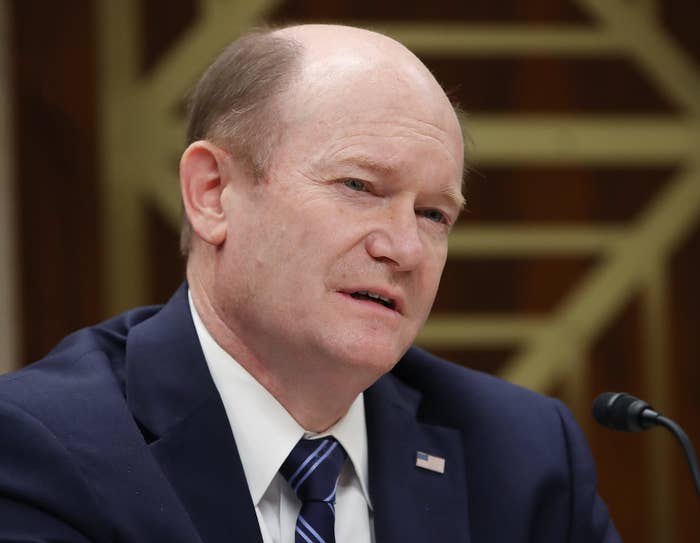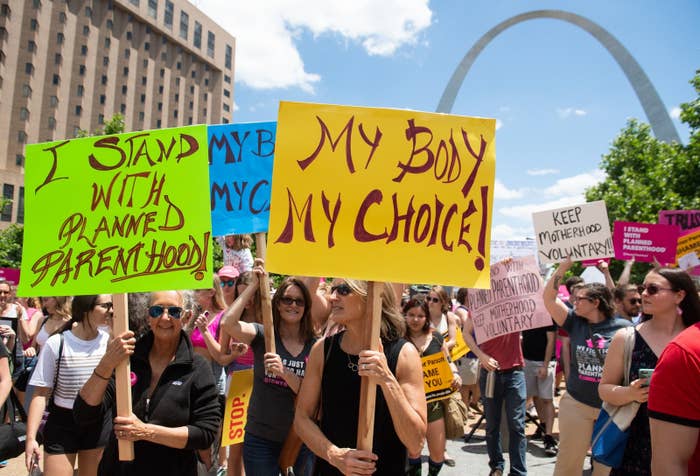
WASHINGTON — It was 7 a.m. and Sen. Chris Coons was sitting in his office trying to decide which prayer breakfast to go to.
On the one hand, there was the one made up entirely of Democratic senators that is “really more of a book session,” he said. On the other, there was the bipartisan prayer breakfast, a Senate tradition dating back to World War II, where they sing hymns, hear a sermon, sometimes whip votes, and make policy decisions. In both cases, the breakfasts are closed to everyone besides senators and faith leaders, and they all vow not to disclose what is discussed behind those doors.
Usually there’s an even number of Democrats and Republicans attending the prayer breakfasts, but lately, Coons said that Democratic cochair of the breakfast, Sen. Angus King, has been “troubled by the declining numbers of Democrats.”
Coons, the Democratic senator from Delaware, told BuzzFeed News he worries that his own party has increasingly ceded religion to Republicans, allowing the GOP to become a de facto Party of God. That characterization — which Coons passionately argues is wildly inaccurate — has caused Democrats to miss out on a significant, active, and organized part of their base, he argues.
As he looks at the massive fight over abortion rights playing out right now across the country, Coons feels like his own party is leaving behind a key weapon: churchgoing Christians.
“I’ve met a lot of people who are personally against abortion … but they feel equally strongly that it is not a decision that the state should be involved in, and it’s particularly not a decision that should be enforced through criminal law,” Coons said.
“I think there is a huge reservoir of people who feel very strongly about [abortion rights,] but who have for 40 years felt that this is a settled issue and not something that’s really going to change,” he continued, “but now it’s being very clearly presented to them that it will.”
In a 2014 poll, Pew found that 65% of Presbyterians and 48% of Catholics thought abortion should be legal in “all or most cases,” while 30% of Presbyterians and 47% of Catholics thought it should be illegal in “all or most cases.” (Polling on abortion is difficult to measure and often contradictory, but these answers based on denomination are revealing nonetheless.)
“Communities of faith are an untapped resource of activism and support and advocacy,” Sara Ratcliffe, vice president of Catholics for Choice, an abortion rights advocacy group, told BuzzFeed News on Thursday.
“Activating, mobilizing, and encouraging communities and people of faith to speak out and speak up from that perspective is absolutely important. We need to correct the myth that all Catholics and all Christians believe one thing or another, and especially when it comes to abortion access that myth is completely false.”

And it’s not just abortion rights. From President Donald Trump’s plan to separate kids from their families at the border to the ongoing fight over gun control, Coons argues that if Democrats are looking for an organized group of people to really rally around an issue and make their voices heard, people of faith are a terrific place to start.
Of course, people of faith are already a part of the Democratic base. In the 2018 midterm elections, 52% of those who voted Democratic said they attend religious services a few times a month, according to Pew Research — though white evangelicals still overwhelmingly voted Republican (75%). Religious and particularly Christian communities have been a key part of the protests against the Trump administration’s immigration policies, and traditionally black Protestant, Baptist, and Methodist churches have long been heavily involved in social justice movements and activism.
But Coons sees a hesitancy — if not a fear — from many members of his own party of embracing religion and really activating those voters.
“Since the ’80s, the religious right has announced that Christianity is all about two issues: abortion and gay marriage,” Coons said, speaking to BuzzFeed News from his office on Capitol Hill. “Being against them, that is.”
As a result, Democrats have shied away from claiming Christianity as a part of their political identity, from mentioning their faith in their speeches, from attending church services with voters and making faith a significant part of their campaigns, or from citing it as part of the reason they went into politics — even though they will say that all the time in the off-the-record prayer breakfasts, Coons said.
Coons recounted a time when he was out in Ohio campaigning for Democratic Sen. Sherrod Brown in 2018. When he was introducing Brown at an event, Coons mentioned that they got to know each other well through a prayer group Brown hosted in the Capitol.
“So I’m looking out at the audience and it’s abundantly clear that they’re like, ‘Prayer group? Sherrod?’” Coons said, adding that Brown hadn’t talked much about his faith on the trail before, but started to incorporate it more in his campaigning from then on. (Brown’s office confirmed this and pointed BuzzFeed News to a Bible passage he quoted in his victory speech after his trip with Coons.)
“There is something about our current cultural environment that makes Democrats uncomfortable with publicly saying, ‘The whole reason I got into public service was because of the values I’ve learned at synagogue, at my church, through my faith.’ We are much more uncomfortable I think with formal religiosity. We have been pushed into feeling like this is not welcome, is not celebrated, is maybe not even appropriate.”
While all of the Democratic candidates for president identify as being affiliated with one religion or another, only one has really leaned into faith as a part of his campaign, Indiana Mayor Pete Buttigieg, a gay churchgoing Christian who was raised Catholic but now is part of an Anglican congregation. Coons has already endorsed former vice president Joe Biden in the race — he did, after all, replace Biden in the Senate — but Coons said he is hopeful Buttigieg can help activate young Christians who have felt rejected by the church due to its association with social conservatism and scandal, and decided to leave.
Over the past decade, the US population has become increasingly less religious, Pew found in multiple studies, and young adults are much less likely to identify as religiously affiliated than anyone in older generations.
“If you’ve grown up with the priest abuse scandals in the Catholic Church, and the ways in which televangelists have failed their flock, and the other stunning examples of fallenness by clergy, if that’s your whole image of religion, then of course it has produced a negative backlash in a generation,” Coons said.
“I am hopeful for and excited to see the progressive Christian voices of a younger generation, and I’m very hopeful that Mayor Pete, for example, ends up inspiring younger people” who had left the church because they saw it as not accepting of their sexuality or their views on abortion.
Coons can’t stand arguments that begin with, “The way we win elections is…” he said. But maybe, if Democrats start talking about their faith more, start making voters who see religion as a big part of their life feel more represented by the Democratic Party, they could end up seeing a whole new part of their base become activated and enthusiastic, they could start to take the reputation of the Party of God back from the Republicans, and maybe this would end up winning them some elections after all.

